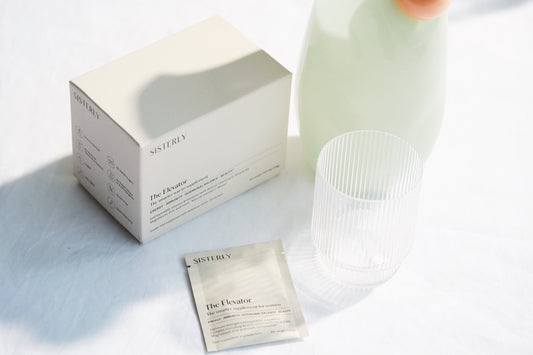In the fast-paced world we live in, stress seems to be an inevitable companion on our journey. Navigating the exhilarating landscape of education, career, parenting, and personal growth is often made more challenging by the hormonal highs and lows of womanhood. The five-step SISTERLY Stress Protocol empowers women to harness stress and turn it into a motivational force for change, using stress management to turn overwhelm and chaos into clarity and balance…
Stress management
There are so many different causes of stress from emotional, financial, physical, relationship, parenting and challenging working environments. There will be times in the month when you feel like you can take on the world and just debunk those stresses as they arise. Then, when hormone imbalance prevails stress gets more of a grip and the effects are noticed by those around you.
How does your body react when you are stressed?
- Your adrenal glands produce stress hormones.
- The nervous system becomes frazzled and over-stimulated.
- Muscles become tense, tight, and sore.
- The immune system starts running on overdrive.
- Your energy systems and metabolism are working overtime.
- Your digestive system gets into a spin causing bloating and tummy troubles.
What does stress feel like?
Negative thought patterns, racing mind, difficulty sleeping, brain fog, poor concentration, inability to make decisions (or good decisions!), low mood, low energy, worrying, feeling tearful and fearful, panic attacks and palpitations and just generally not coping well in situations that you wouldn’t normally feel flustered. Sound familiar? It’s time that managing stress becomes a priority. So, the big question that’s on every superwoman’s mind…. how do you get rid of stress?
SISTERLY wisdom to deal with stress
With three fierce women at the helm of SISTERLY, we’re no strangers to stress. We’ve rubbed shoulders with some of the best wellness experts and reviewed many weird and wonderful ways of how to naturally reduce stress. Here’s our five-step SISTERLY Stress Protocol centered around easy-to-implement healthy lifestyle habits designed to melt stress and restore calm composure.
Step 1 – Sleep Scene
Sleep is one of the best ways to help reduce stress and anxiety and poor sleep impacts your hormones, metabolism and ability to think clearly. Unfortunately, stress sets up a vicious no-sleep cycle. You need sleep because you’re exhausted from stress, yet a fretful mind and tense body foster unsettled nights and ridiculously early mornings. To improve your quantity and quality of sleep, it’s all about the winddown time.
- Cut back on stimulants - caffeine, nicotine, sugary drinks, sugary foods, alcohol and blue light technology. Turn off the TV two hours before bed.
- Circadian rhythm reset – studies show daylight or light exposure increases sleep quality and duration and makes it easier to get off to sleep. Having a regular morning alarm and evening bedtime also encourages a better sleep-wake cycle.
- Bedtime routine – Bath, book, bed! If it works for toddlers, it works for us too! Indulge in some sleepy aromatherapy bath time self-care or magnesium salts to help your body unwind. SISTERLY Loves the Deep Sleep Set aromatherapy face oil, body balm and pillow spray from www.groundwellbeing.com. We have secured a SISTERLY circle offer for you with GROUND, use the code SISTERLY20 at checkout for 20% off on their site.
- Bedroom environment – noise, light and being too hot disrupt sleep. Invest in some good blackout curtains, turn down the radiator or open the window before you go to bed for some slumber freshness. Urmmmm, dare we mention it, but have you tried silk pillowcases yet?

Step 2 – Best supplements for stress
The effects of stress on the female body can be hugely impactful and one way to counterbalance the nutrition depletions caused by stress is to supplement with key nutrients which your body requires more of during stress. These include vitamin C, magnesium, zinc and the B vitamins such as vitamin B6. So, what can you take to reduce stress? The Elevator, is a daily supplement scientifically designed especially for women, which contains therapeutic levels of all of these key stress-busting nutrients. Rest assured, on your most stressful of days, The Elevator is aligned with what your body needs.
Step 3 – Be Mindful
It's crucial to acknowledge and manage the psychological aspects of stress. If you’re wondering what is a natural stress reducer? SISTERLY points you in the direction of mindfulness. When stress is on the rampage learning to meditate may seem too difficult because a whirling mind becomes distracting. It’s much easier to start with breathwork. Join a class or download an app and master the art of continuous conscious breath which acts as a circuit breaker for stress and anxiety.
World renowned Meditation instructor and founder of Unplug.com Suze Yalof Schwartz, says; " Getting started with breathwork is so easy. All you need to do to help centre yourself when stress escalates is to focus on breathing in for four (sec), hold your breath for four, release for four, and hold for four - that 16 seconds will make an impact. Repeat as many times as you need, until you feel calm and centred."
Using breathwork to settle your mind facilitates a natural progression to meditation. SISTERLY recommends getting started with a guided meditation app such as Unplug or Open.
Cultivating a positive mindset through gratitude practices and self-reflection can also help de-power stress and yoga is of course a go-to for both a physical and mindful way to relax. Our good friend at Yogaru regularly posts new sequences to manage stress, try them out at www.yogaru.ie.
"Stress is part of life but when it becomes a constant it can cause imbalances , physically and mentally. Yoga is regarded as one of the best ways to manage stress. It encourages a slow steady breath, meditative flow, and on a very simple level distracts you from over thinking." Ruth Delahunty, Yogaru

Step 4 – Get Moving
Our SISTERLY message is that if you can make the exercise or activity you love part of your lifestyle, then it’s a blow for your stress and a win for your wellbeing.
Exercise lowers stress hormones, builds emotional resilience to stress and encourages your body to release endorphins and feel-good hormones so it’s important to find time in your schedule to do ‘your thing’. Exercise is different for everyone. If you haven’t found your exercise tribe yet, then keep looking! It doesn’t need to be extreme, painful or difficult. A brisk daily walk or even a 15-minute online HIT class is a great start.
Here at SISTERLY, we’re big swimmers. From our nutritionist Susie who likes to hit 60 pool laps three times a week to our founders Aoife and Jenny who love a good sea swim. So much so, that you can catch them at the SISTERLY charity sea swim on Monday 27th November, 10am at The Forty Foot, Dun Laoghaire, Dublin. Bring your swim kit and join them for a dip in aid of MS Ireland. You can let us know that you would love to join via Instagram or send us an email to hello@sisterlylab.com.

But we’re not all water lovers! Maria from marketing loves the slopes, lives in the mountains, and gets her skis on every weekend. And on a good day of snowfall, she’ll get up at the crack of dawn to do a ski tour before work. That’s SISTERLY dedication!
Step 5 – Thermal Therapy
It’s entirely counterintuitive to expose your body to physical stress when it’s already finding it hard to cope with your current level of stress. However, studies show thermal therapy – exposing your body to hot and cold temperatures – to be an effective tool for reducing stress and teaching your body to be more resilient to future stresses. Louise O’Riordan, co-founder of SISTERLY says; “I head to ARTHA Wellness Sanctuary in LA at least once a week for an infrared sauna and cryotherapy, a great stress buster and reset.”
Here’s how to get started with thermal therapy…
- Shower switch up –finish your hot shower with a 3-minute blast of cold. Once you get used to this, alternate hot and cold for three rotations.
- Ice water facetime –you can gain all the benefits of an ice bath by simply immersing your face in a large bowl of ice water. Start with 20 seconds and build up to 1 minute.
- Sauna relaxation - after a gym swim head to the sauna to ease stress and relax tense muscles. Not a fan of traditional saunas, no sweat! Infrared saunas are more comfortable and just as effective for stress relief.
- Ice breaker– reset your vagus nerve and switch your nervous system from a stressed state to a relaxed state and alleviate anxiety and depression with a cold water immersion. Sign up for a local Wim Hof Method class to learn how to do this safely and effectively.

What can stress do to a woman's body?
If left unchecked, too much stress may cause havoc with hormone balance. You might start to experience changes in your cycle regularity or changes in your periods. Or if you’re past that phase of womanhood then stress can easily notch up the severity and frequency of menopausal symptoms.
Stress management – you’ve got this!
Following the SISTERLY Stress Protocol is a fantastic way to start your journey of unwinding your stress response. By taking a daily sachet of The Elevator, alongside a new bedtime routine, finding your exercise tribe, setting aside time for mindfulness practice, and being curious about thermal therapy - you’ll be adding valuable stress-busting wellness habits into your lifestyle.
References
Sleep
Telzer EH, Fuligni AJ, Lieberman MD, Galván A. The effects of poor quality sleep on brain function and risk taking in adolescence. Neuroimage. 2013 May 1;71:275-83. doi: 10.1016/j.neuroimage.2013.01.025. Epub 2013 Feb 1. PMID: 23376698; PMCID: PMC3865864.
Leproult R, Van Cauter E. Role of sleep and sleep loss in hormonal release and metabolism. Endocr Dev. 2010;17:11-21. doi: 10.1159/000262524. Epub 2009 Nov 24. PMID: 19955752; PMCID: PMC3065172.
Drake C, Roehrs T, Shambroom J, Roth T. Caffeine effects on sleep taken 0, 3, or 6 hours before going to bed. J Clin Sleep Med. 2013 Nov 15;9(11):1195-200. doi: 10.5664/jcsm.3170. PMID: 24235903; PMCID: PMC3805807.
Campbell SS, Dawson D, Anderson MW. Alleviation of sleep maintenance insomnia with timed exposure to bright light. J Am Geriatr Soc. 1993 Aug;41(8):829-36. doi: 10.1111/j.1532-5415.1993.tb06179.x. PMID: 8340561.
Emens JS, Yuhas K, Rough J, Kochar N, Peters D, Lewy AJ. Phase angle of entrainment in morning- and evening-types under naturalistic conditions. Chronobiol Int. 2009 Apr;26(3):474-93. doi: 10.1080/07420520902821077. PMID: 19360491; PMCID: PMC2699216.
Lack LC, Gradisar M, Van Someren EJ, Wright HR, Lushington K. The relationship between insomnia and body temperatures. Sleep Med Rev. 2008 Aug;12(4):307-17. doi: 10.1016/j.smrv.2008.02.003. PMID: 18603220.
Thermal therapy
Tomoko Kinoshita, Shinya Nagata, Reizo Baba, Takeshi Kohmoto, Suketsune Iwagaki. Cold-Water Face Immersion Per Se Elicits Cardiac Parasympathetic Activity. 2006 Volume 70 Issue 6 Pages 773-776. DOI https://doi.org/10.1253/circj.70.773
Hussain J, Cohen M. Clinical Effects of Regular Dry Sauna Bathing: A Systematic Review. Evid Based Complement Alternat Med. 2018 Apr 24;2018:1857413. doi: 10.1155/2018/1857413. PMID: 29849692; PMCID: PMC5941775.
Dugué B, Leppänen E. Adaptation related to cytokines in man: effects of regular swimming in ice-cold water. Clin Physiol. 2000 Mar;20(2):114-21. doi: 10.1046/j.1365-2281.2000.00235.x. PMID: 10735978.
Exercise
Childs E, de Wit H. Regular exercise is associated with emotional resilience to acute stress in healthy adults. Front Physiol. 2014 May 1;5:161. doi: 10.3389/fphys.2014.00161. PMID: 24822048; PMCID: PMC4013452.




